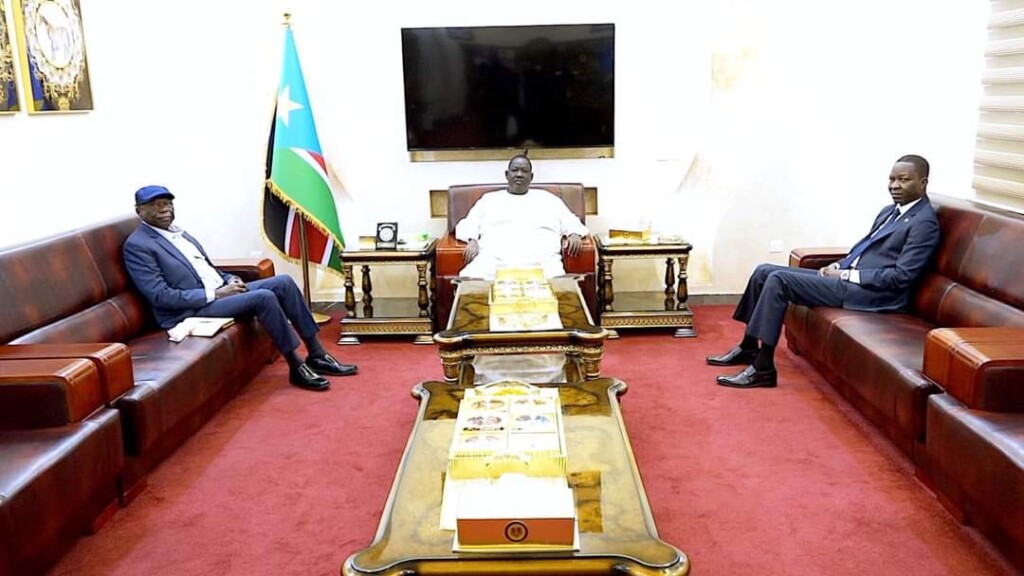SPLM-N El Hilu and Sudan army to jointly facilitate delivery of aid in South Kordofan

SPLM-N leader Abdelaziz El Hilu (L) and Deputy SAF Commander Shamseldin Kabbashi (R) in a meeting presided by South Sudan mediator Tut Galuak in Juba, May 4 (Photo: Sovereignty Council media office)
The leader of the mainstream Sudan People’s Liberation Movement-North, Abdelaziz El Hilu, met with Lt Gen Shamseldin Kabbashi, deputy commander of the Sudanese Armed Forces (SAF) and member of the Sovereignty Council, the South Sudanese capital of Juba yesterday. Both sides agreed to facilitate the delivery of humanitarian aid to the hundreds of thousands of displaced people in South Kordofan and Blue Nile region, with each party responsible for the delivery of aid in the areas under its control.
Both parties agreed that delegations from the de facto Sudanese government and the SPLM-N El Hilu will meet within a week, to sign a document outlining the humanitarian operations in the two states.
The mediation team in South Sudan which aims at resolving the war between the SAF and the paramilitary Rapid Support Forces (RSF) in Sudan, but also armed conflicts between the SPLM-N El Hilu and the SAF, on Saturday convened a meeting between Hilu and Kabbashi in the capital Juba.
In a press statement on Saturday, the SPLM-N expressed gratitude to the South Sudanese mediation efforts and to international donors for “their continuous endeavours to address the Sudanese crisis”.
The movement reported that more than 600,000 displaced people have fled clashes between the SAF, RSF, and SPLM-N in South Kordofan’s Nuba Mountains to areas under control of the SPLM-N. Another 50,000 people in Blue Nile region* have sought refuge in SPLM-N El Hilu-controlled areas in the region.
Tut Galuak, security advisor to South Sudanese President Salva Kiir, told reporters in Juba that El Hilu affirmed his readiness to explore “any solution” to the crisis in Sudan.
Welcomed
The Civil Democratic Forces (Tagadom) alliance welcomed the positive outcome of the meeting between El Hilu and Kabbashi.
In a press release on Saturday evening, Tagadom expressed its gratitude to the government of South Sudan and renewed its call for the SAF and RSF to reach “common understanding about removing obstacles hindering the delivery of humanitarian aid to those affected by the war and to avert famine for more than 25 million people in Sudan”.
The alliance asserted that “peace can only be achieved through negotiations and cessation of hostilities”, and renewed its call to the SAF and RSF to return to the Jeddah peace platform, set up by the USA and Saudi Arabia soon after the war erupted in April last year, but has not achieved any step forward so far.
The mainstream Forces of Freedom and Change (FFC-Central Council), a member of Tagadom, Yassir Arman, founder of the SPLM-N-Democratic Revolutionary Movement, member of the FFC-CC and Tagadom, the Unionist Gathering, and Mubarak Ardol, head of the Democratic Alliance for Social Justice, all welcomed the agreement.
Arman commented by saying that the agreement came at the right time, and that it would be better to include all parties to the war in South Kordofan and Blue Nile region to have the aid safely arrive in the targeted areas.
His political opponent Ardol praised what he described as the wisdom of the meeting’s parties in responding to the deteriorating situation in the two states, particularly in the Nuba Mountains.
* In August 2022, Gen Ahmed El Omda, governor of the then Blue Nile state, issued a number of decrees based on the October 2020 Juba Peace Agreement (JPA) by which the state became a region, and its seven localities became ‘governorates’. International IDEA said in an analysis in 2021 that though the Blue Nile and Kordofan protocol incorporated in the JPA grants autonomy to these states, it does not specifically provide that they become a region.











 and then
and then